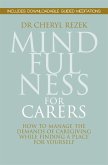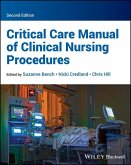Critical Care
Delivering Spiritual Care in Healthcare Contexts
Herausgeber: Sedgwick, Peter; Pye, Jonathan; Todd, Andrew
Critical Care
Delivering Spiritual Care in Healthcare Contexts
Herausgeber: Sedgwick, Peter; Pye, Jonathan; Todd, Andrew
- Broschiertes Buch
- Merkliste
- Auf die Merkliste
- Bewerten Bewerten
- Teilen
- Produkt teilen
- Produkterinnerung
- Produkterinnerung
A collection of essays focusing on spiritual care within the delivery and provision of healthcare today. The contributors combine academic and professional expertise to discuss themes including: spirituality, pluralism and multi-faith practice, healthcare ethics, legal and policy issues, mental health, and beginning and end of life issues.
Andere Kunden interessierten sich auch für
![Outcome Oriented Chaplaincy Outcome Oriented Chaplaincy]() Brent PeeryOutcome Oriented Chaplaincy38,99 €
Brent PeeryOutcome Oriented Chaplaincy38,99 €![Multifaith Care for Sick and Dying Children and Their Families Multifaith Care for Sick and Dying Children and Their Families]() Paul NashMultifaith Care for Sick and Dying Children and Their Families34,99 €
Paul NashMultifaith Care for Sick and Dying Children and Their Families34,99 €![Jungian Psychotherapy with Medical Professionals Jungian Psychotherapy with Medical Professionals]() Suzanne HalesJungian Psychotherapy with Medical Professionals46,99 €
Suzanne HalesJungian Psychotherapy with Medical Professionals46,99 €![Mindfulness for Carers Mindfulness for Carers]() Cheryl RezekMindfulness for Carers15,99 €
Cheryl RezekMindfulness for Carers15,99 €![Challenging Concepts in Paediatric Critical Care Challenging Concepts in Paediatric Critical Care]() Challenging Concepts in Paediatric Critical Care89,99 €
Challenging Concepts in Paediatric Critical Care89,99 €![Critical Care Manual of Clinical Nursing Procedures Critical Care Manual of Clinical Nursing Procedures]() Critical Care Manual of Clinical Nursing Procedures58,99 €
Critical Care Manual of Clinical Nursing Procedures58,99 €![The Practice of Emergency and Critical Care Neurology The Practice of Emergency and Critical Care Neurology]() Wijdicks, Eelco F. M., MD, PhD, FACP (Profes Professor of NeurologyThe Practice of Emergency and Critical Care Neurology235,99 €
Wijdicks, Eelco F. M., MD, PhD, FACP (Profes Professor of NeurologyThe Practice of Emergency and Critical Care Neurology235,99 €-
-
-
A collection of essays focusing on spiritual care within the delivery and provision of healthcare today. The contributors combine academic and professional expertise to discuss themes including: spirituality, pluralism and multi-faith practice, healthcare ethics, legal and policy issues, mental health, and beginning and end of life issues.
Hinweis: Dieser Artikel kann nur an eine deutsche Lieferadresse ausgeliefert werden.
Hinweis: Dieser Artikel kann nur an eine deutsche Lieferadresse ausgeliefert werden.
Produktdetails
- Produktdetails
- Verlag: Jessica Kingsley Publishers
- Seitenzahl: 280
- Erscheinungstermin: 21. Juli 2015
- Englisch
- Abmessung: 226mm x 150mm x 18mm
- Gewicht: 408g
- ISBN-13: 9781849054973
- ISBN-10: 1849054975
- Artikelnr.: 42398414
- Herstellerkennzeichnung
- Libri GmbH
- Europaallee 1
- 36244 Bad Hersfeld
- gpsr@libri.de
- Verlag: Jessica Kingsley Publishers
- Seitenzahl: 280
- Erscheinungstermin: 21. Juli 2015
- Englisch
- Abmessung: 226mm x 150mm x 18mm
- Gewicht: 408g
- ISBN-13: 9781849054973
- ISBN-10: 1849054975
- Artikelnr.: 42398414
- Herstellerkennzeichnung
- Libri GmbH
- Europaallee 1
- 36244 Bad Hersfeld
- gpsr@libri.de
Edited by Jonathan Pye, Peter Sedgwick and Andrew Todd
Preface. Part 1. Constructing Spiritual Care. 1.1. The narrative of
spiritual care: Locating models of spiritual care within contemporary
healthcare education and practice. Jonathan H. Pye. 1.2. Discourses of
Spiritual Health Care. Hamish Ferguson-Stuart. 1.3. Making Use of Models of
Healthcare Chaplaincy. Stephen Flatt. 1.4. Biblical texts, chaplaincy and
mental health service users. Anne McCormick. Part 2. Negotiating Spiritual
Care in Public. 2.1. The value of spiritual care: Negotiating spaces and
practices for spiritual care in the public domain. Andrew Todd. 2.2. Legal
and policy frameworks for spiritual care. Layla Welford. 2.3. From atheist
to Zoroastrians: What are the implications for professional healthcare
chaplaincy of the requirement to provide spiritual care to people of all
faiths and none? Mirabai Galashan. 2.4. Developing a Model of Chaplaincy
through the Translation of Nursing Theory. Debbie Hodge. Part 3.
Researching Spiritual Care. 3.1. Making spiritual care visible: The
developing agenda and methodologies for research in spiritual care. Steve
Nolan. 3.2. Researching spiritual care in a mental health context. Julian
Raffay. 3.3. How secular is the NHS? The significance of volunteers and
their beliefs. Karen MacKinnon. 3.4. Observing, recording and analysing
spiritual care in an acute setting. Rodney Baxendale. Part 4. Critical
Issues in Spiritual Care. 4.1. The practice of spiritual care in the
context of suffering: Questions for the self as a 'spiritual being'. Peter
Sedgwick. 4.2. Assisted suicide: A dignified end to severe and enduring
mental illness? Charles Thody. 4.3. Insights into spiritual need and care
arising out of the experience of those living with Mild Cognitive
Impairment (MCI). Richard Wharton. 4.4. 'A hidden wholeness': Spiritual
care in a children's hospice. Mark Clayton. Bibliography.
spiritual care: Locating models of spiritual care within contemporary
healthcare education and practice. Jonathan H. Pye. 1.2. Discourses of
Spiritual Health Care. Hamish Ferguson-Stuart. 1.3. Making Use of Models of
Healthcare Chaplaincy. Stephen Flatt. 1.4. Biblical texts, chaplaincy and
mental health service users. Anne McCormick. Part 2. Negotiating Spiritual
Care in Public. 2.1. The value of spiritual care: Negotiating spaces and
practices for spiritual care in the public domain. Andrew Todd. 2.2. Legal
and policy frameworks for spiritual care. Layla Welford. 2.3. From atheist
to Zoroastrians: What are the implications for professional healthcare
chaplaincy of the requirement to provide spiritual care to people of all
faiths and none? Mirabai Galashan. 2.4. Developing a Model of Chaplaincy
through the Translation of Nursing Theory. Debbie Hodge. Part 3.
Researching Spiritual Care. 3.1. Making spiritual care visible: The
developing agenda and methodologies for research in spiritual care. Steve
Nolan. 3.2. Researching spiritual care in a mental health context. Julian
Raffay. 3.3. How secular is the NHS? The significance of volunteers and
their beliefs. Karen MacKinnon. 3.4. Observing, recording and analysing
spiritual care in an acute setting. Rodney Baxendale. Part 4. Critical
Issues in Spiritual Care. 4.1. The practice of spiritual care in the
context of suffering: Questions for the self as a 'spiritual being'. Peter
Sedgwick. 4.2. Assisted suicide: A dignified end to severe and enduring
mental illness? Charles Thody. 4.3. Insights into spiritual need and care
arising out of the experience of those living with Mild Cognitive
Impairment (MCI). Richard Wharton. 4.4. 'A hidden wholeness': Spiritual
care in a children's hospice. Mark Clayton. Bibliography.
Preface. Part 1. Constructing Spiritual Care. 1.1. The narrative of
spiritual care: Locating models of spiritual care within contemporary
healthcare education and practice. Jonathan H. Pye. 1.2. Discourses of
Spiritual Health Care. Hamish Ferguson-Stuart. 1.3. Making Use of Models of
Healthcare Chaplaincy. Stephen Flatt. 1.4. Biblical texts, chaplaincy and
mental health service users. Anne McCormick. Part 2. Negotiating Spiritual
Care in Public. 2.1. The value of spiritual care: Negotiating spaces and
practices for spiritual care in the public domain. Andrew Todd. 2.2. Legal
and policy frameworks for spiritual care. Layla Welford. 2.3. From atheist
to Zoroastrians: What are the implications for professional healthcare
chaplaincy of the requirement to provide spiritual care to people of all
faiths and none? Mirabai Galashan. 2.4. Developing a Model of Chaplaincy
through the Translation of Nursing Theory. Debbie Hodge. Part 3.
Researching Spiritual Care. 3.1. Making spiritual care visible: The
developing agenda and methodologies for research in spiritual care. Steve
Nolan. 3.2. Researching spiritual care in a mental health context. Julian
Raffay. 3.3. How secular is the NHS? The significance of volunteers and
their beliefs. Karen MacKinnon. 3.4. Observing, recording and analysing
spiritual care in an acute setting. Rodney Baxendale. Part 4. Critical
Issues in Spiritual Care. 4.1. The practice of spiritual care in the
context of suffering: Questions for the self as a 'spiritual being'. Peter
Sedgwick. 4.2. Assisted suicide: A dignified end to severe and enduring
mental illness? Charles Thody. 4.3. Insights into spiritual need and care
arising out of the experience of those living with Mild Cognitive
Impairment (MCI). Richard Wharton. 4.4. 'A hidden wholeness': Spiritual
care in a children's hospice. Mark Clayton. Bibliography.
spiritual care: Locating models of spiritual care within contemporary
healthcare education and practice. Jonathan H. Pye. 1.2. Discourses of
Spiritual Health Care. Hamish Ferguson-Stuart. 1.3. Making Use of Models of
Healthcare Chaplaincy. Stephen Flatt. 1.4. Biblical texts, chaplaincy and
mental health service users. Anne McCormick. Part 2. Negotiating Spiritual
Care in Public. 2.1. The value of spiritual care: Negotiating spaces and
practices for spiritual care in the public domain. Andrew Todd. 2.2. Legal
and policy frameworks for spiritual care. Layla Welford. 2.3. From atheist
to Zoroastrians: What are the implications for professional healthcare
chaplaincy of the requirement to provide spiritual care to people of all
faiths and none? Mirabai Galashan. 2.4. Developing a Model of Chaplaincy
through the Translation of Nursing Theory. Debbie Hodge. Part 3.
Researching Spiritual Care. 3.1. Making spiritual care visible: The
developing agenda and methodologies for research in spiritual care. Steve
Nolan. 3.2. Researching spiritual care in a mental health context. Julian
Raffay. 3.3. How secular is the NHS? The significance of volunteers and
their beliefs. Karen MacKinnon. 3.4. Observing, recording and analysing
spiritual care in an acute setting. Rodney Baxendale. Part 4. Critical
Issues in Spiritual Care. 4.1. The practice of spiritual care in the
context of suffering: Questions for the self as a 'spiritual being'. Peter
Sedgwick. 4.2. Assisted suicide: A dignified end to severe and enduring
mental illness? Charles Thody. 4.3. Insights into spiritual need and care
arising out of the experience of those living with Mild Cognitive
Impairment (MCI). Richard Wharton. 4.4. 'A hidden wholeness': Spiritual
care in a children's hospice. Mark Clayton. Bibliography.








